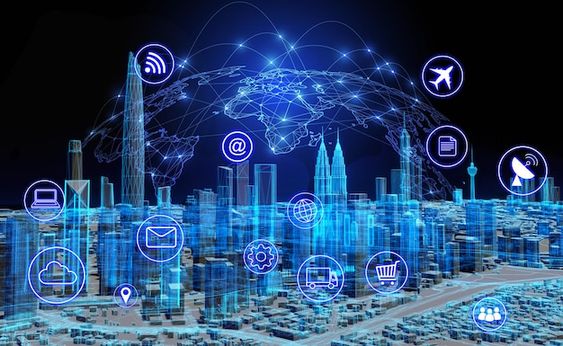
Introduction
The digital future is rapidly becoming a reality rather than just a far-off idea. Every area of our lives is changing as a result of the unparalleled speed at which technology is developing; this includes not just how we work and communicate, but also how we study and amuse ourselves. This blog examines the major changes, new developments, and intriguing prospects that will shape our digital future.
Key Transformations
1. Work and Business
Workplace and corporate operations have been completely transformed by the digital revolution. Cloud computing, video conferencing, and collaboration tools have made remote work commonplace. Organizations are progressively implementing digital transformation tactics in order to optimize processes, improve client interactions, and stimulate creativity.
- Automation and AI: By automating repetitive operations, analyzing massive data sets, and offering insights that inform decision-making, automation and AI are transforming a number of industries. These technologies are essential to contemporary company strategy; they range from chatbots providing customer service to AI-driven analytics forecasting market trends.
- E-commerce Boom: The retail industry has changed as a result of the emergence of e-commerce platforms. Convenience, variety, and personalized experiences are all provided by online purchasing. Customers’ online shopping experiences are being improved by technologies like virtual reality (VR) and augmented reality (AR), which let users see objects in their surroundings.
2. Communication and Social Interaction
Digital technologies have fundamentally altered how we communicate and interact socially.
- Social media: These days, social media platforms are a need for community development, marketing, and communication. They provide up new possibilities for both personal and professional networking by facilitating global information sharing and real-time interaction.
- Instant Messaging and Video Calls: Tools for video conferencing and instant messaging have sped up and simplified communication. Relatives, friends, and coworkers can communicate easily across geographic boundaries.
3. Education and Learning
The digital future is reshaping education and learning processes.
- Online Learning: Massive Open Online Courses (MOOCs) and e-learning platforms offer accessible and adaptable learning options. Online learning provides individualized and interactive learning opportunities for everything from professional development to basic school.
- Educational Technologies: The efficacy of education is being improved by innovations such as gamified learning, AI-driven tutoring systems, and interactive simulations. By meeting a variety of learning needs and styles, these tools enhance inclusivity and engagement in the classroom.
4. Healthcare
Digital technologies are transforming healthcare, improving patient outcomes, and enhancing operational efficiency.
- Telemedicine: By facilitating remote consultations, telemedicine lessens the need for in-person appointments and increases access to medical treatment. From the convenience of their homes, patients can obtain prompt medical advice and treatment.
- Health Monitoring: Vital signs, physical activity, and other health parameters are tracked in real-time via wearable technology and health apps. With the help of these technologies, people can take proactive responsibility for their health and give healthcare professionals useful data.
Emerging Trends
1. 5G Connectivity
Improved connectivity, reduced latency, and quicker internet speeds are all promised with the introduction of 5G networks. This development will open up new avenues for efficiency and creativity by facilitating the spread of Internet of Things (IoT) gadgets, driverless cars, and smart cities.
2. Blockchain Technology
Blockchain technology’s decentralized, transparent, and secure solutions are redefining entire sectors. Applications of blockchain technology extend beyond cryptocurrency and include digital identity verification, supply chain management, and smart contracts.
3. Extended Reality (XR)
AR, VR, and MR together comprise Extended Reality (XR), which is revolutionizing training, education, and entertainment. With the use of these immersive technologies, users can interact and consume digital information in new ways, resulting in realistic and captivating experiences.
4. Quantum Computing
Complex problems that traditional computers are unable to tackle may be resolved using quantum computing. Even though technology is still in its infancy, quantum computing has the potential to completely transform industries like optimization, materials research, and cryptography.
Opportunities and Challenges
Opportunities:
- Innovation and Entrepreneurship: There are countless opportunities for both in the digital future. Digital technologies can be utilized by both established and startup organizations to develop novel goods, services, and business strategies.
- Global Connectivity: Digital technologies enable access to international markets and global collaboration by removing geographical constraints. Economic growth and cultural exchange are promoted by this connectedness.
- Sustainability: By maximizing resource use, cutting waste, and fostering the creation of clever, environmentally friendly solutions, digital technology can propel sustainability initiatives.
Challenges:
- Privacy and Security: With the widespread use of digital technology, worries over cybersecurity and data privacy are intensifying. Ensuring secure digital environments and safeguarding sensitive information are critical.
- Digital Divide: There exists a disparity in access to digital technologies, which can intensify social and economic inequality. In order to close this gap, efforts must be made to guarantee digital inclusion.
- Ethical Considerations: Careful thought needs to be given to the ethical ramifications of developing technologies like genetic engineering and artificial intelligence. To ethically use these technology, rules and ethical standards must be established.
Conclusion
There are a ton of opportunities and revolutionary potential in the digital future. To fully reap the benefits of digital technologies, we must embrace innovation, promote inclusion, and overcome obstacles as we traverse this quickly changing terrain. We can build a more efficient, sustainable, and connected future for everybody by utilizing the power of digital transformation.
Contact Information:
- Phone: +971 56 703 4385
- Email: info@siliconpioneers.com
- Hire Us: https://www.fiverr.com/siliconpioneers
- Have Query: https://siliconpioneers.com/contact-us/